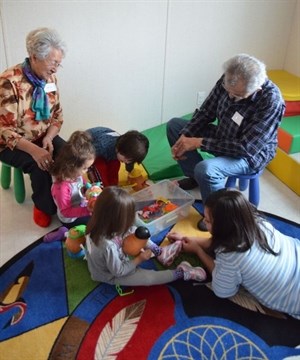
Elders Victor Antoine and Cecilia Gottfriedson with support worker Rachel Marchand. Devon, Shiloh and Melody play while learning traditional Nsyilxcen.
(CHARLOTTE HELSTON / iNFOnews.ca)
February 15, 2013 - 10:16 AM
By Charlotte Helston
When Leonard Gregoire was a kid growing up in 1930s Okanagan, he was ridiculed for speaking in his traditional Okanagan language. By then, many of his peers were learning to speak English, and he was one of few children to gain a lasting fluency in the Nsyilxcen language. Now, some 70 years later, things have changed.
His people are coming back to him.
They are listening to his words, spoken in a familiar but distant language, and they want to learn. Gregoire is one of just 18 known elders who can speak in the old way out of the Okanagan Indian Band's 1,800 people. Along with six other elders—Pauline Archachan, Virginia Gregoire, Cecilia Gottfriedson, Victor Antoine, William Marchand and Wilke John Louie—Gregoire is speaking to a new generation in the traditional tongue, transmitting the language and all its teachings before it is too late.
It's all part of an OKIB program begun a few weeks ago called "hinaugh chekwook"tl"ap il skwook"tl"eelt I'll "tl" ghugh "tl" a hap". The English translation shows the beauty of the language. It means "Sun rising over the hill on the fawn and the older people."
The early learning program for children aged one to four unfolds in a warm and welcoming house called the Language Nest where elders and children let conversation flow naturally. The home-like setting allows for vocabulary to be taught in the traditional way, as Gregoire learned from his parents.
Within the language nest there is a strict no English policy. The children spend 18 hours a week with fluent elders and staff learners in 100 per cent Nsyilxcen. Notepads are sometimes used to ask questions, but for the most part, staff and students pick up vocabulary as they partake in traditional practices. As children play with traditional birch bark toys, the voices of their elders, who chat with each other in Nsyilxcen, reinforce the sounds and pronunciation of the language. The interactive, land-based model throws institutionalized teaching out the window and does things the Okanagan way.
The importance of language is something Cecilia Gottfriedson's father used to talk about.
"My dad used to worry about language survival," Gottfriedson says. As a kid, she told her dad to give it up, to stop fretting about it. But now, as an elder of her community, she cherishes the old words and worries about their future too.
Hearing the words of her ancestors spoken by today's youth gives her hope. She's excited by the quick progress of the kids in the program who add more words to their vocabulary every day. Gottfriedson imagines a day when the kids are older and holding full conversations with her, and this makes her smile.
Support worker Rachel Marchand believes the program will revive the language at a time when it's teetering on the brink of endangerment.
"We realized our elders are all in their 70s and 80s, and in the next ten years our language could be gone," Marchand says. "Instead of having an endangered language, we are trying to revitalize it."
"Some of our elders say if you don't have your language, how can you prove you are part of the land? Without it, we really are assimilated."
The program emphasizes getting out on the land, and isn't restricted to the language nest. The afternoon activity is often a walk down the road and into a grove of trees. And the children aren't the only students. Program staff, including the elders, are learning too.
"It's neat to watch the elders outside saying, what's the word for this, the word for that?" Marchand says. "It's helping them to remember."
The eight participating fluent elders have held on to their language despite the impact of residential schools and the loss of their land. It wasn't easy retaining the language, and they know that strengthening it in the community won't be easy either. Gregoire says despite growing interest, not all band members are ready to learn.
"If people want to learn, they'll come. You can't force people," he says.
Victor Antoine agrees it's all about attitude. He says years of being told their language is worthless has done its damage on the people and left many disinterested in learning their own language.
"It's disheartening for me and other elders," Antoine says. "We are all that's left."
Antoine grew up traditionally with Okanagan being the language spoken at home. He wishes for more of that now.
"There are young people who do care. You have these programs, but it's not enough. Their parents should be here," he says.
Antoine says we live in an age of "spiritual loss," one in which communities are disconnected from each other and from their ancestors. He believes language can help stitch them back together.
"You teach language, you teach culture," he says.
Language nests have made a difference around the world in places like Hawaii and New Zealand, but not many in B.C. The Okanagan Indian Band’s program has taken inspiration from global nests, and from one in Adam’s Lake. Aside from the Adam's Lake nest, just one other in B.C. was developed by the Lil'wat Nation (formerly known as the Mount Currie Band).
There are seven children enrolled at the language nest. There are always at least two elders around, in addition to Rachel Marchand (support worker), Julie Brewer and Mariel Belanger (assistants). Natalie Chambers and Kama Steliga are the program consultants. They worked with Kevin Ned, education manager, to develop the program.
The language nest has received funding from the Department of Canadian Heritage First Peoples Culture Council and First Nations Aboriginal Early Childhood Development Reinvestment Initiative. This year's funding ends March 31 and the program consultants are seeking further funding to secure the future of the language nest, and the future of the Nsyilxcen language.
The children enrolled in the program are only a few years old, but one day, they will be the elders. They will be the ones keeping the language alive 70 years from now.
To contact a reporter for this story, email Charlotte Helston at chelston@infotelnews.ca or call (250)309-5230.
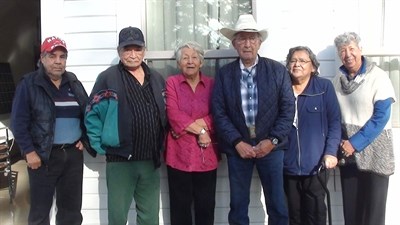
Elders: Wilke John Louie, Adam Gregoire, Cecilia Gottfriedson, Leonard Gregoire, Virginia Gregoire and Pauline Archachan
Image Credit: Mariel Belanger
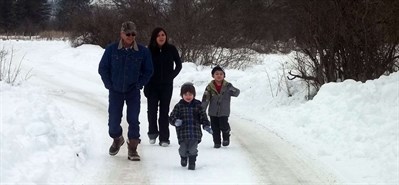
Elder William Marchand and assistant Julie Brewer accompany Devon and Matthias on a nest walk.
Image Credit: Mariel Belanger
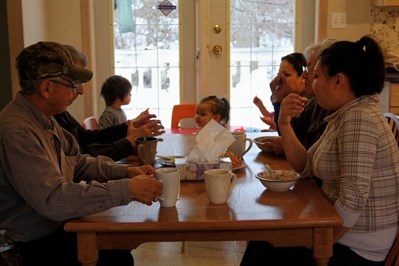
Cecilia Gottfriedson, William Marchand and Victor Antoine (Elders) and Julie Brewer (assistant), Devon and Mikah (children)
Image Credit: Mariel Belanger
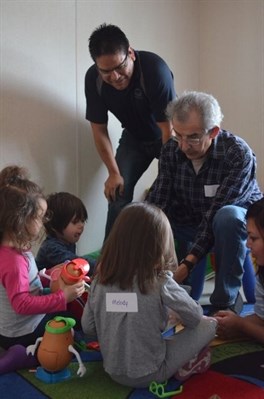
Education manager Kevin Ned joins elders and children at the language nest.
(CHARLOTTE HELSTON / iNFOnews.ca)
News from © iNFOnews, 2013